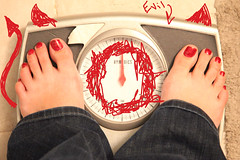 Many skinny Americans are fed up with obesity, reports the Los Angeles Times:
Many skinny Americans are fed up with obesity, reports the Los Angeles Times:
“Americans as a society are getting fed up with the matter of obesity. No doubt about it,” said Douglas Metz, chief of health services for American Specialty Health, a San Diego-based company that offers wellness programs to employers. “Some pockets of society are taking positive action, and unfortunately others are taking negative action. That’s what happens when a society hasn’t figured out what the fix is.”
Recent notable actions include:
* A recent and ultimately unsuccessful plan at Lincoln University in Pennsylvania sought to take the body mass index of every enrolling student and require the obese to lose weight or take a fitness class before they could graduate.
* In Mississippi, legislators tried to pass a bill to let restaurants prohibit obese people from dining.
* In an interview with the New York Times last August, Toby Cosgrove, chief executive of the Cleveland Clinic, one of the nation’s largest medical centers, provoked national outrage when he said that, if it were up to him, he would stop hiring the obese. He later apologized for his remarks.
* Last summer in Florida, animal rights activists at People for the Ethical Treatment of Animals (PETA) took aim at heavy women in a “Save the whales” billboard campaign that featured an overweight, bikini-clad woman. It read: “Lose the blubber. Go vegetarian.” Angry reactions caused the organization to remove the signs.
Statistics about obesity are being assessed in the current debates on how to reduce the nation’s health care costs:
A report by Emory University researchers projected last November that by 2018 the United States could expect to spend $344 billion on healthcare costs attributable to obesity. Obesity-related costs would account for 21% of healthcare spending, up from 9.1% today, said the report, sponsored in part by the United Health Foundation and the American Public Health Assn.
Providing a different take on the issue, it’s time to call in the sociologist:
“In our society, being heavy has become more of a stigma lately because we’re struggling with other issues of consumption,” says Abigail Saguy, associate professor of sociology at UCLA.
The economic climate, a recent history of people buying more than they can afford as well as environmental issues, including the depletion of our planet’s resources, are making people feel more angry about society’s overconsumption, she says. Obviously overweight people are an easy target.
“They’re almost a caricature of greed, overconsumption, overspending, over-leveraging and overusing resources,” says Saguy. “Though it’s not entirely rational, it’s an understandable reaction, especially in a country founded on the Puritan ethics of self-reliance, sacrifice and individual responsibility. If people feel they’re sacrificing, then see someone spilling over an airplane seat, they feel angry that that person is not making the same sacrifices they are.”
Research indicates that discrimination based on weight has been increasing in recent years:
Rebecca Puhl, a researcher at Yale University’s Rudd Center for Food Policy and Obesity, published [two papers] last January — one in the journal Obesity, the other in the International Journal of Obesity — Puhl reported that weight discrimination in the United States increased 66% over the prior decade.
“Weight discrimination is highly prevalent in American society and increasing,” said Puhl, who cites several possible reasons. Among them are a lack of legislation to prohibit weight discrimination and an increase in media coverage of obesity (up fivefold from 1992 to 2003). Most media framed the problem of obesity as one of personal responsibility, she reported.






